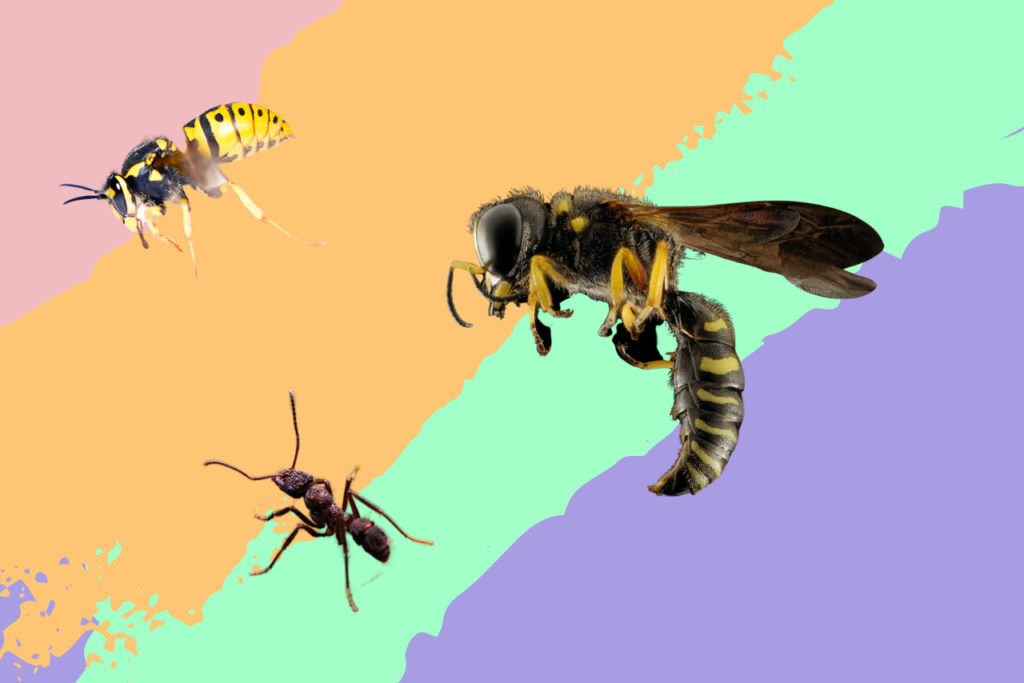Spare a thought for our Aussie cousins on the other side of the world. Whilst here in the UK, we start flapping our arms and exiting the picnic blanket the moment the whisper of a wasp is detected, al fresco dining down under has to compete with black widows, paralysis ticks, tiger snakes and the rest.
Suddenly, the threat of some fruit flies doesn’t really feel worthy of an article.
But just because your life isn’t in danger doesn’t mean that the insects and bugs found on these shores aren’t a nuisance. Indeed, as we all know, flies, wasps and other things with wings tend to make a beeline (ahem) for summer garden parties, causing annoyance and potentially ruining appetites.
However, this year – quite rightly – we’re being urged not to kill flies, wasps and other bugs that come into our homes. As Yorkshire Live reports, “this summer you’ll probably see fewer flies and wasps than ever coming inside to buzz around your head”. They go on to explain that “That’s because the UK’s flying insect population has declined by as much as 60% in the last 20 years”.
Paul Hadaway, the director of conservation at Kent Wildlife Trust says via The Natural History Museum, “These declines are happening at an alarming rate and without concerted action to address them we face a stark future. Insects and pollinators are fundamental to the health of our environment and rural economies”.
It seems that we should be encouraging bugs to thrive. As such, it’s time to put down the rolled up newspaper, pick up the smartphone, and find some more humane ways to keep those bugs at bay.
However, if you want to stop them from invading your home, we don’t blame you. Here’s what to do about common summer pests.
Wasps
While we’ve already warned against killing bugs for the good of humanity, here’s some more reasons to never swat a wasp; sure, it’s inhumane, but you might inflame the situation, too.
According to Somerset Live, “A swatted wasp releases a chemical that is picked up by other wasps and they see it as a call to arms and come flying to the scene with stingers at the ready’’.
Now that catastrophe has been averted, let’s talk about preventing them from arriving on the scene in the first place.
Repelling wasps is a good first line of defence; prevention is better than cure, and all that. A tried and tested trick is to hang up crumpled brown paper bags, which gives the illusion of wasp nests and sends a message to other wasps that the territory is occupied.
If you’re having a picnic and are keen for something a little more concrete, then covering food is the best way to deter wasps a – mesh food covers, which act like a tent, are ideal here.
The Kent-based pest control company Pest Control 4U emphasises preventive measures against wasp infestations, especially in the summer. Regular property inspections to seal potential nesting sites and maintaining tightly sealed bins are recommended. They also suggest the use of wasp-repelling plants like thyme and spearmint in gardens. If a wasp nest is found, they strongly advise against disturbing it and recommend seeking professional help from their team for safe and effective removal.

Hornets
Hornets are really just a different type of wasp, but one which seems to look and feel more menacing; even their name elicits fear in spheksophobes. Actually, hornets are generally considered to be less aggressive than wasps, if unprovoked. That said, their stings are more painful than typical wasp stings, due to the different chemicals found in hornet venom.
Leaving them to it, then, seems to be the most obvious solution. But if their presence is causing a downer at your summer garden party, then the experts at Shield Pest Control recommend that, if ‘’they are present in sufficiently large numbers to be a nuisance’’, then there’s likely a nest present in your garden, at which point, it’s sensible to call in the professionals to remove it in an environmentally responsible way.
Flies
To deter flies from coming into your home, keep basil and mint on your windowsill. Why? They hate the smell of these herbs. You can pick up a pot of basil in Aldi for just 67p while Tesco charges £1.30 for a medium size basil or mint pot, as the Mirror reports.
If you don’t have the space for a row of pot plants on each and every windowsill, then you can stop flies entering your house using a simple bag of coins, too. Think that sounds like an expensive solution? Here’s the good news; 1p coins work just as well as larger denominations!
Read: Our IDEAL guide to maintaining a pest-free home
Fruit Flies
These little critters deserve a separate subtitle. Often seen hovering above a fruit bowl or drifting around the kitchen sink, come summer these teeny tiny pests seem to appear from nowhere.
Put simply, fruit flies are attracted to exposed, ripened fruit that’s started fermenting; they just love that just-off, sweet-smelling scent!
If you want to be extra careful (and ruin that still life, fruit bowl aesthetic you’ve been cultivating), then the solution is simple; put your fresh produce in the fridge to keep fruit flies at bay.
Ants
We’ve all experienced an ant-infestation at one picnic or another, and we all know just how fast a single interloper can turn into a mass invasion.
A few simple, natural methods are at hand to repel ants from joining you at the picnic blanket or dinner table. Firstly, consider setting a decoy for the ants; leave some sugary food or drink in a spot away from where you’re eating, drawing the ants to it and away from you.
Alternatively, you can create a barrier around your dining area using chalk or talcum powder; this is enough to confuse hungry, curious ants.
Finally, ants are repelled by acidic aromas (they have sweet fangs, after all); wipe down your dining area with vinegar or lemon juice to keep them away.
And in the spirit of environmentally responsible solutions, check out these 10 ways to make your garden wildlife friendly. We can’t wait to be invited to your bug-free picnic!





